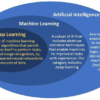After doing a BSc Electrical Engineering in Ethiopia, MSc and PhD at the University Twente in the same discipline, Abeje Mersha started in 2014 as a teacher and researcher at the Saxion University of Applied Sciences. Now about 6 years later, he is appointed as a professor in Unmanned Robotic Systems. This is an excellent opportunity to get to know him a bit better, and ask him what he thinks about Industry 4.0.
Our research group within Saxion, Abeje explains, is focusing its activities around two different themes: “unmanned robotic systems”, which he is chairing and “smart industrial systems”, which is chaired by his colleague prof. Dirk Bekke. Upon the question to give me an example of an unmanned system, Abeje starts to explain about a project in which they are developing a “flying hand”. It is effectively a drone combined with a robot that is able to interact physically with other objects in mid-air. One of the application areas is the use of this drone/robot combination to inspect and perform maintenance of the blades of large wind turbines. This is now done by humans, that need to go up there and inspect the blades bit by bit. This is rather expensive, results in a very long downtime of the turbine, and is not without danger. The drone/robot combination will be able to take over and do this inspection and maintenance, in a faster, safer and more cost-effective way.
Another project Abeje mentioned is the development of a mobile ground robot, that can for example be used on the factory floor. An important aspect of this robot is that it needs to be flexible and modular. So within Abeje’s group, they are trying to work on a modular system that can be controlled with open software, to enable the user to adapt it in a simple and fast manner.
When I ask Abeje on what “Industry 4.0” actually is, he first reacts that it is quite a broad term, covering many different developments. Eventually he describes it as the smart use of (big) data to adjust the work or production process in a flexible manner. He did have a look at the course that is being developed within the INDEX project, and thinks that the most important technical bits are covered. But, he mentions, do not forget about the human aspect and the attitude. Most of the industry is rather conservative and work according to methods and protocols that have been used for many years. Industry 4.0 is calling for a change, and it is important to include the human in this process.
In the Netherlands we do not have a major manufacturing industry, Abeje points out. There are a lot of small innovative companies that are front-runners when it comes to digitization, robotics, and modeling of large amounts of data. And although there is quite some entrepreneurial spirit, it would certainly accelerate the implementation of Industry 4.0 if we bring together all these activities. Luckily we are close to Germany, that does have a huge manufacturing industry, in which all of this can be implemented.
On the question how this relates to education, he thinks that within Saxion we do implicitly include various aspects of Industry 4.0 already in the various curricula. It does not mean that we have an explicit course on Industry 4.0, but we do train our students to become familiar with inter- and multidisciplinary work, including digitalization and the value of (big) data. Students are involved in ongoing projects with companies that are dealing with different aspects of Industry 4.0. Abeje thinks that the student nowadays is much better prepared than 10 or 20 years ago. We can always do better, and the INDEX online learning course will certainly help in this.




0 Comments